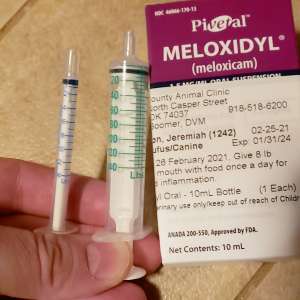





Meloxidyl for dogs is a type of medication that’s often vet-recommended to treat pain and inflammation. The medication can be useful for short-term pain such as post-surgery recovery. However, many vet’s find Meloxidyl for dogs useful for addressing long-term conditions like arthritis.
At AvenueDogs.com, we get questions about the usefulness of certain “off-label” medications. Meloxidyl for dogs is one that often gets brought up. We may not be the expert on Meloxidyl for dogs, but we can give you enough information to jump-start the decision-making process before you consult your vet.
If you’d rather listen to this blog, just click play on the YouTube video below:
(Keep in mind: Avenue Dogs is reader-supported. When you buy through links on our site, we may earn an affiliate commission (with no additional cost to you)).
If you’d like to know more about home medications that can help your pet, check out our vet-approved list below:
| Dyne for Dogs: For Energy & Weight Gain | Omeprazole for Dogs: For Ulcers & Inflammation | Enrofloxacin for Dogs: For Bacterial Infections |
Cefpodoxime for Dogs: For Bacterial Infections | Sucralfate for Dogs: Chronic Upset Stomach | Cosequin for Dogs: For Joint Health |
| Ursodiol for Dogs: For Liver & Gallbladder | Trazodone for Dogs: For Anxiety & Aggression | Mometamax for Dogs: For Ear Infections |
| Credelio for Dogs: For Ticks & Fleas | Chlorpheniramine for Dogs: For Allergy-Related Conditions | Butorphanol for Dogs: For Painful Coughs |
| Dinovite for Dogs: For Irritating, Itchy Coat | Dasuquin for Dogs: For Joint Health | Meloxidyl for Dogs: For Pain & Inflammation |
| Glandex for Dogs: For Digestive Support | Rilexine for Dogs: For Bacterial Infections | Enalapril for Dogs: For Cardiac Conditions |
| Quercetin for Dogs: For Allergy & Inflammation | Carprovet for Dogs: For Pain & Inflammation | Pimobendan for Dogs: For Congestive Heart Failure |
| Simplicef for Dogs: For Bacterial Infections | Clindamycin for Dogs: For Bacterial Infections |
Until then, check out some vet-approved info on Meloxidyl for dogs.
Top 10 FAQs on Meloxidyl for Dogs
You’ve got questions, and we’ve got answers! Here are the top 10 Frequently Asked Questions about Meloxidyl for dogs. After a brief explanation of what Meloxidyl is and what it can do for your pet, we’ll go into more detail below. So, without further ado, let’s get started!



- What is Meloxidyl for dogs?
Meloxidyl for Dogs is a non-steroidal anti-inflammatory drug (NSAID) often prescribed to alleviate pain and inflammation in dogs. It’s typically used for conditions like arthritis or post-surgery pain management.
- What is Meloxidyl for dogs used for?
Meloxidyl for Dogs is primarily used to reduce pain and inflammation associated with conditions like osteoarthritis or after surgery. It belongs to the class of non-steroidal anti-inflammatory drugs (NSAIDs).
- Does Meloxidyl for dogs require a prescription?
Yes, Meloxidyl for dogs is a prescription medication. A veterinarian needs to evaluate your dog’s condition and determine the appropriate dosage. Never administer Meloxidyl for dogs without veterinary approval.
- Is Meloxidyl safe for dogs?
Meloxidyl is generally safe for dogs when administered correctly under veterinary supervision. However, there are potential Meloxidyl for dogs side effects you should look out for.
- What are the potential Meloxidyl for dogs side effects?
Potential Meloxidyl for dogs side effects include gastrointestinal issues, kidney damage, and alterations in behavior like lethargy and changes in appetite or thirst/urination patterns. Monitoring is important during treatment.
- How long can a dog take Meloxidyl?
Generally, Meloxidyl for dogs can be given daily for up to two weeks. Long-term usage should always be under veterinary supervision due to potential side effects like gastrointestinal problems and kidney damage.
- How is Meloxidyl administered to dogs?
Meloxidyl for dogs can be given as an oral suspension or tablet, as prescribed by a vet. The dosage is usually divided into parts across morning/evening time periods.
- Does Meloxidyl for dogs need to be refrigerated?
No, Meloxidyl for Dogs does not need to be refrigerated. It should be stored at room temperature, away from light and moisture.
- What precautions should be taken when administering Meloxidyl for Dogs?
Consult a vet before starting Meloxidyl for Dogs, never exceed the recommended dosage, monitor the dog for side effects, and keep a log of dosage and any behavioral changes to share with the vet.
- How is the dosage of Meloxidyl for Dogs determined?
The dosage of Meloxidyl for Dogs is determined by the vet based on the dog’s weight, age, overall health, and the condition being treated. It is typically started at a low dose and adjusted as necessary.



Think Meloxidyl for dogs could be a good option for you? Read on to learn a bit more about the medication before consulting your vet for a prescription.
What is Meloxidyl for Dogs?
Meloxidyl for dogs is a non-steroidal anti-inflammatory drug (NSAID). It’s designed to tackle your dog’s pain and inflammation, often caused by arthritis or surgery.
Picture your pup in their younger days, bounding around, full of life. That’s what Meloxidyl can help bring back. It’s all about improving your dog’s quality of life by reducing those aches and pains.
When you choose Meloxidyl for dogs, you’re choosing relief and comfort for your furry friend. It’s about seeing that familiar tail wag with vigor again, hearing the pitter-patter of paws on your floors. Isn’t that what every dog owner wants for their best friend?



Remember, Meloxidyl for dogs isn’t just a medication, it’s a pathway to happier, healthier days for your dog. And that’s something we can all wag our tails about!
Meloxidyl for Dogs Uses



Meloxidyl, known by its scientific name Meloxicam, is a popular choice among vets. It can be a real game-changer for our canine companions suffering from certain health issues. There are many Meloxidyl for dogs uses. Let’s get into some of the more popular ones.
Primarily, Meloxidyl is a nonsteroidal anti-inflammatory drug (NSAID), used to reduce pain and inflammation. Is your doggie limping because of arthritis? Meloxidyl might just hit the spot. It helps alleviate the discomfort, letting your pooch prance around like old times.
It doesn’t stop there, though. This versatile medication is also used post-operatively. If your pet has undergone surgery, such as a spay or neuter procedure, Meloxidyl for dogs can help manage the pain during recovery, making the healing journey smoother.
Additionally, it’s been used to treat fevers in dogs. So, if your furry friend is feeling under the weather, Meloxidyl might just do the trick.
In a nutshell, Meloxidyl for dogs is like a trusty Swiss army knife in your pet-care toolkit, addressing various pain and inflammation-related issues. But remember, every dog is unique, and what works for one might not work for another. Always check with a vet before adding Meloxidyl into your dog’s daily routine.
How Does Meloxidyl Work?
Let’s unravel the mystery of how Meloxidyl for dogs does its magic.
You know how when you stub your toe, it swells up and throbs like a bass drum at a rock concert? That’s inflammation doing its thing. Your dog’s body responds in a similar way to injury or disease, only they can’t tell you about it. That’s where Meloxidyl steps onto the stage.



Meloxidyl for dogs targets substances in your dog’s body called prostaglandins. These little mischief-makers are what cause the pain and swelling your pup feels when they’re injured. Meloxidyl quiets down pain and swelling by reducing the production of these prostaglandins.
But here’s the kicker, it doesn’t just hit the mute button on the pain. It also helps to lower fever and makes your dog feel more comfortable. So, while it’s not a cure, it helps your furry friend to feel better while they heal.
Meloxidyl For Dogs Dosage
Alright, let’s tackle the nitty-gritty – the correct Meloxidyl for dogs dosage for your pup.
Each dogs situation is different, so there’s no one-size-fits-all Meloxidyl for dogs dosage. It’s a bit of a balancing act, and you’ll need some input from your vet. Generally speaking, the dosage depends on your dog’s weight and pain. It’s usually given at 0.09 mg/lb (0.2 mg/kg) for the first day, followed by 0.045 mg/lb (0.1 mg/kg) daily after that.
But don’t let those numbers get your tail in a knot. Meloxidyl comes with a handy-dandy dosing syringe that’s marked with weight bands. So, you just match your dog’s weight to the right band on the syringe, and voila! You’ve got the correct dosage.



Remember, consistency is key here. Try to give Meloxidyl to your furry friend at the same time each day. And, be sure not to go overboard. Even if Rover seems to be in a bit of discomfort, resist the urge to give more Meloxidyl. Too much of a good thing can turn into a bad thing pretty quickly.
Meloxidyl For Dogs Dosage Chart
The Meloxidyl for dogs dosage chart below is organized by weight. Keep in mind that this is a general guideline, and actual dosages may vary depending on the specific needs of your pet.
Also, be aware that the first Meloxidyl for dogs dosage you administer will be double the normal dosage. This gives your pup a headstart on dealing with the pain.
For the first day, the dosage is 0.09mg per pound of dog weight (0.2 mg/kg). For the following days, the dosage is halved to 0.045 mg/lb (0.1 mg/kg) of your dog’s body weight daily. So, for example:
| Dog’s Weight in Pounds | Dose on the First Day | Dosage on Each Day After |
| 10 | 0.9 mg | 0.45 mg |
| 20 | 1.8 mg | 0.9 mg |
| 30 | 2.7 mg | 1.35 mg |
| 40 | 3.6 mg | 1.6 mg |
| 50 | 4.5 mg | 2.25 mg |
| 60 | 5.4 mg | 2.7 mg |
| 70 | 6.3 mg | 3.15 mg |
| 80 | 7.2 mg | 3.6 mg |
| 90 | 8.1 mg | 4.05 mg |
| 100 | 9 mg | 4.5 mg |
| 100+ | Consult your vet. | Consult your vet. |
How is Meloxidyl for Dogs Administered?
Administering Meloxidyl for dogs is straightforward, and it’s designed to be as stress-free as possible for both you and your four-legged friend. Meloxidyl is an oral suspension that comes with a specially calibrated dropper, making it a breeze to measure out the precise dose your dog needs.
First things first, give the bottle a good shake. Then, withdraw the correct dose using the dropper. The dropper is marked in pound increments, so it’s a snap to find the right dosage for your dog’s weight. You want to give your pup the proper dose only once a day.
Now here’s the trick: instead of trying to squirt it into your dog’s mouth (which can be a battle with some dogs!), try adding it to their food. Most dogs don’t mind the taste, and mixing it with their dinner can make it easier for both of you. If your dog is a picky eater, you might want to test this out with a small amount of food to make sure they’ll eat it all.



Remember, consistency is key with Meloxidyl. Try to give it to your dog at the same time each day, which can help keep the level of medication steady in their system.
And there you have it! Administering Meloxidyl for dogs doesn’t have to be a chore. It’s all about making it as easy as pie for your dog to get the relief they need.
What if I Miss a Dose of Meloxidyl?
When it comes to administering Meloxidyl for dogs, consistency is key to effectively manage your pup’s pain and inflammation. If you accidentally skip a dose, don’t sweat it! Simply give the missed dose as soon as you remember.
But if it’s near the time for the next dose, then you’re better off skipping the missed one altogether. It’s a no-go to double up on doses trying to play catch-up because that can lead to an overdose and possibly cause serious health problems like gastrointestinal issues and kidney damage.
Does Meloxidyl for Dogs Require A Prescription?
Yes, Meloxidyl for dogs is a prescription medication. Due to potential side effects and the need for the correct dosage based on a dog’s weight and overall health, it should only be administered under the guidance of a veterinarian. Hence, it is not available over the counter and requires a prescription from a licensed veterinarian.
What Alternatives Are There for Meloxidyl for Dogs?
There are several alternatives to Meloxidyl for dogs that can help manage pain and inflammation. Here’s a rundown of options that might be worth considering:
Prescription Alternatives:
- Carprofen (Rimadyl): This is another non-steroidal anti-inflammatory drug (NSAID) that’s commonly used for pain relief in dogs. It’s particularly popular for post-operative pain, but it’s also a go-to for managing arthritis.
- Deracoxib (Deramaxx): This is a selective NSAID that specifically targets COX-2 enzymes, which are responsible for inflammation and pain. It’s frequently used to manage post-operative pain and chronic osteoarthritis in dogs.
Non-Prescription Alternatives:
- Glucosamine and Chondroitin Supplements: These over-the-counter supplements help maintain joint health and can alleviate some symptoms of arthritis. While they’re not pain relievers per se, they can help improve mobility and quality of life for dogs with joint issues.
- Fish Oil: Rich in omega-3 fatty acids, fish oil has anti-inflammatory properties and can aid in reducing joint inflammation.
Remember, though, every dog is different, so what works like a charm for one might not cut the mustard for another. Alternatives to Meloxidyl for dogs can be a real lifesaver, but it’s crucial to keep a close eye on your pup’s response to any new medication or supplement.
When Will You See Results from Meloxidyl for Dogs?
When using Meloxidyl for dogs, you can expect to see results within a reasonable timeframe. Typically, you should start noticing improvements in your dog’s condition within a few days to a couple of weeks after starting the treatment.
Meloxidyl For Dogs Side Effects
When it comes to Meloxidyl for dogs, it’s important to be aware of potential side effects. While side effects are generally uncommon, it’s essential to monitor your dog’s response to the medication. Here’s a breakdown of the possible side effects:
- Common Meloxidyl for dogs side effects – Mild gastrointestinal upset, such as vomiting or diarrhea. These symptoms are usually temporary and resolve on their own.
- Less likely Meloxidyl for dogs side effects – Changes in appetite, increased thirst, or changes in urination patterns.
- Least common Meloxidyl for dogs side effects – Allergic reactions, which may include facial swelling, hives, or difficulty breathing. Seek immediate veterinary attention if you observe any of these signs.
Remember, it’s important to follow your veterinarian’s recommended dosage and never exceed the prescribed amount. If your dog experiences any adverse reactions or if you have concerns about potential side effects, it’s always best to consult your veterinarian for guidance.
Are There Any Risk Factors for Meloxidyl for Dogs?
When considering the use of Meloxidyl for dogs, it’s important to be aware of potential risk factors that may affect its suitability for your pet. Here are some key points to consider:



- Allergies – If your dog has a known allergy to meloxicam or other nonsteroidal anti-inflammatory drugs (NSAIDs), it may be at an increased risk of adverse reactions to Meloxidyl.
- Pre-existing health conditions – Dogs with certain pre-existing conditions such as liver or kidney disease, gastrointestinal ulcers, or bleeding disorders may be more susceptible to the side effects of Meloxidyl.
- Concurrent medications – Some medications may interact with Meloxidyl, potentially increasing the risk of side effects. It’s crucial to inform your veterinarian about any medications your dog is currently taking.
- Age and size – Puppies and senior dogs, as well as small or toy breeds, may have a higher risk of experiencing adverse effects from Meloxidyl. Close monitoring is particularly important for these individuals.
- Individual sensitivity – Each dog is unique, and while most dogs tolerate Meloxidyl well, there is a possibility of individual variation in sensitivity or response to the medication.
Considering these risk factors will help you make an informed decision about using Meloxidyl for your dog. It’s always recommended to consult with your veterinarian, who can assess your dog’s specific situation and determine the appropriateness of Meloxidyl for their needs.
Are There Any Drug Interactions with Meloxidyl for Dogs?
When using Meloxidyl for dogs, it’s essential to be aware of potential drug interactions that may occur. Here are some examples of drugs that may interact with Meloxidyl:
- Other NSAIDs – Concurrent use of multiple NSAIDs, such as carprofen or aspirin, can increase the risk of gastrointestinal ulcers and other adverse effects.
- Corticosteroids – Combining Meloxidyl with corticosteroids, such as prednisone, may increase the likelihood of gastrointestinal side effects.
- Anticoagulants – Meloxidyl may interact with anticoagulant medications, such as warfarin, leading to an increased risk of bleeding.
- Diuretics – Some diuretic medications, like furosemide, may interact with Meloxidyl and affect kidney function.
- ACE inhibitors – The combination of Meloxidyl with ACE inhibitors, such as enalapril, may reduce the effectiveness of the ACE inhibitor.
It’s important to inform your veterinarian about any medications your dog is currently taking, including prescription drugs, over-the-counter medications, and supplements. Your veterinarian can assess potential drug interactions and determine the best course of action for your dog’s treatment.
How to Safely Store Meloxidyl for Dogs
Here are some tips on how to safely store Meloxidyl for dogs to ensure its effectiveness and prevent any potential harm. Here are some key points to remember:
- Store Meloxidyl in its original packaging to maintain its integrity and protect it from light.
- Keep the medication out of reach of children and pets to avoid accidental ingestion.
- Store Meloxidyl at room temperature, away from excessive heat or cold, as extreme temperatures can affect its stability.
- Avoid storing Meloxidyl near any sources of moisture or humidity, such as bathrooms or kitchen sinks, as it may compromise the medication’s quality.
- Check the expiration date on the packaging and discard any expired or unused medication properly according to local regulations.



Proper storage of Meloxidyl for dogs is crucial to ensure its efficacy and maintain its safety for your pet. By following these guidelines, you can confidently use the medication as prescribed when needed.
Meloxidyl for Dogs Reviews
Pet owners love Meloxidyl for its effectiveness and positive impact on their dogs’ well-being. Here are summarized reviews from satisfied customers:
“Works Great for Senior Dog”
Meloxidyl works wonders for a 16-year-old dog, providing effective relief. – DogMom325
“Great Product and Price Deal”
Dogs feel great using Meloxidyl, bringing happiness to their owners. – Sal Miles
“Hugely Helpful and Effective”
Meloxidyl is highly beneficial for a dog as an anti-inflammatory and in managing a tumor. Recommended by veterinarians. – Jim H.
“Spectacular Service”
The fast delivery of Meloxidyl impressed a pet owner with a lively and active Morkie. The medication has helped with injuries caused by the dog’s energetic nature. – Lilith
“Amazing Med for Arthritis”
Meloxidyl made a significant difference for an older beagle with arthritis, eliminating the limp and restoring mobility. – SCdogmom
“Easy and Effective for Arthritis”
Meloxidyl has been effective in managing arthritis for a thirteen-year-old dog named Bella. – BellaMom



Pups and their owners appreciate the positive impact Meloxidyl for dogs has on their lives, providing relief from pain and improving their overall well-being.
Where Can You Buy Meloxidyl for Dogs?
This first step to purchasing Meloxidyl for dogs is to get a prescription from your vet. Once you have the prescription you can buy Meloxidyl anywhere that fills prescriptions for pets.
Final Thoughts on Meloxidyl for Dogs
Meloxidyl for dogs could be a good fit for your household if you have one or more pups with chronic pain due to inflammation. It’s a prescription medication that’s ideal for short-term use but can (in some cases) be used long-term.
Now that you have some basic info on Meloxidyl for dogs, it’s time to ask your vet if the medication is right for you!



Related posts:
Natasha Moore is a professional SEO content writer and owner of Word Brokers, LLC. She enjoys traveling, hanging out with pups of all sorts, and reading the biggest books she can find. She’s also a full-time digital nomad, and you can find her writing content from the beach in Mexico, a corner coffee shop in Colombia, or lounging by the lake in Guatemala.

1 Comment